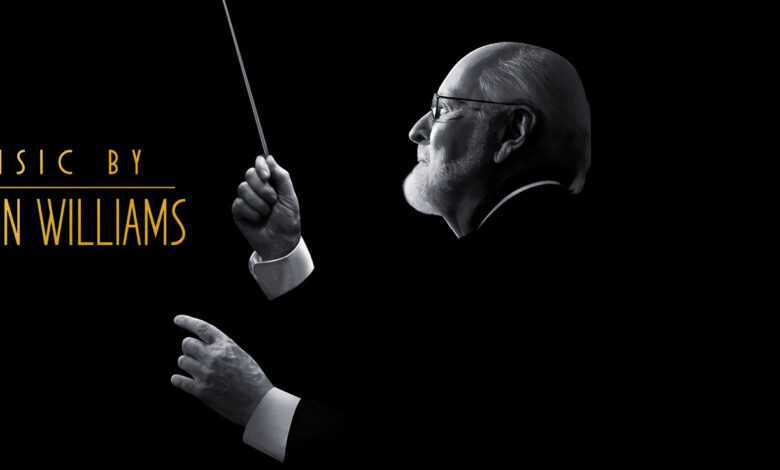“Music for a Musician is Like Breathing” : A Look at Music by John Williams

Olivia Romesburg ’27 / Emertainment Monthly Staff Writer
“Music for a musician is like breathing” says John Williams in the documentary Music by John Williams that premiered on Disney + on November 1st. The documentary discusses John Williams’s career through the years in chronological order. They interviewed people who have worked with him over the years such as Steven Spielberg and George Lucas.
The documentary starts by discussing Williams’ relationship with Spielberg. Spielberg recalls how Williams’ music took his movies to another level, helping the films come to life. Williams talks about how he came up with the theme for Jaws (1975). He wanted to use only the piano to give the film a haunting quality. Spielberg was initially hesitant about using only a piano for the film, not thinking it would be enough, but Williams made him listen to it until he saw the vision.
The documentary then transitions into Williams’ life growing up. His parents were both very musical. His father believed that all of his children should play the piano. In this segment, Williams recalled that for every hour he wanted to play basketball he had to put an hour into learning how to play the piano. He grew up listening to his father play the drums on the radio. This inspired Williams to start focusing on instrumentation within music. With both of his parents being musically inclined, Williams believed as a kid that once you grew up you played music somewhere. By the time he was in high school, Williams was practicing 5-6 hours a day. He began to take notice of the scores of films. He learned how to write for various instruments by studying conductor scores. He learned through practicing and self-teaching.
The documentary then goes on to talk about his family later in life. Williams’ wife, Barbara, died of an aneurysm at age 41. When this occurred he left his daughter Jennifer Williams to take care of herself and her two brothers, at the age of 18, while Williams left to take care of his wife. He later wrote a violin concerto after his wife passed away because she had always loved the violin. He shared that he felt like Barabra was helping him create music long after her death. Jennifer shares many fond memories, including when she recalls him playing the piano “in a little room with a funny rug”.
One of the biggest accomplishments of Williams’ career is his work on nine of the Star Wars films, but did you know that this nearly didn’t happen? Williams almost didn’t write the music for Star Wars because he wanted to write the music for A Bridge Too Far (1977). Spielberg was able to convince and encourage him to do Star Wars: A New Hope (1977). George Lucas wanted the film to have a classical score and for each character to have their own theme. Character themes would later make their way into Williams’ other works such as the first three Harry Potter (2001-2004) films. The last piece that Williams wrote for Star Wars: A New Hope (1977) was the opening fanfare, which would end up being the most iconic piece of the franchise.
The film needed a symphony orchestra which was a new territory for Williams. The soundtrack of the film became a “tribute to the power of orchestra”, and was “forcing a modern audience to contend with the orchestra”. He not only values the orchestra but also the individual players. Williams wrote so much music for the film that it became a double-disc soundtrack. The soundtrack included pieces such as “Cantina Band”, “Princess Leia’s Theme” and the “Main Title”. Over the course of the series, Williams composed more than eighty themes for the Star Wars series. Williams created pieces that served the film that Lucas had created.
Williams does not limit himself to writing music for films. He conducted for the Boston Pops Orchestra for thirteen years and served as their nineteenth conductor. During this time he experienced conducting for live audiences. He has also written music for sports such as “Wide Reciever” used in Sunday night football and “Bugler’s Dream”, the Olympic Fanfare and theme. He conducted the first performance of “Bulger’s Dream” at the 1984 Summer Olympics in Los Angeles, California.
Williams inspired others throughout his career. Chris Martin from Coldplay is in the documentary and talks about how much he admires Williams works. He talks about how he inspired him to make music. Additionally, Key Huy Quan shares his love for Williams and how wonderful it was to work on Indiana Jones and the Temple of Doom (1984) with him at such a young age.
Over the course of Williams’ career, he has worked on many classic films that were such a huge part of so many people’s lives. From Home Alone (1990) to E.T. The Extra-Terrestrial (1982) and Jurassic Park (1993) Williams is able to create impactful and magical soundtracks for every film he works on. As Williams states: “I didn’t lose myself in Hollywood I found myself”. This quote displays how meaningful his career is not only to him but to listeners of his music. This quote encapsulates his career and how meaningful it is.